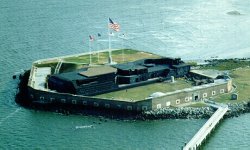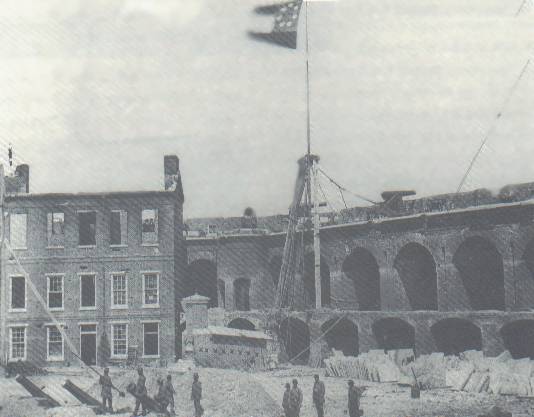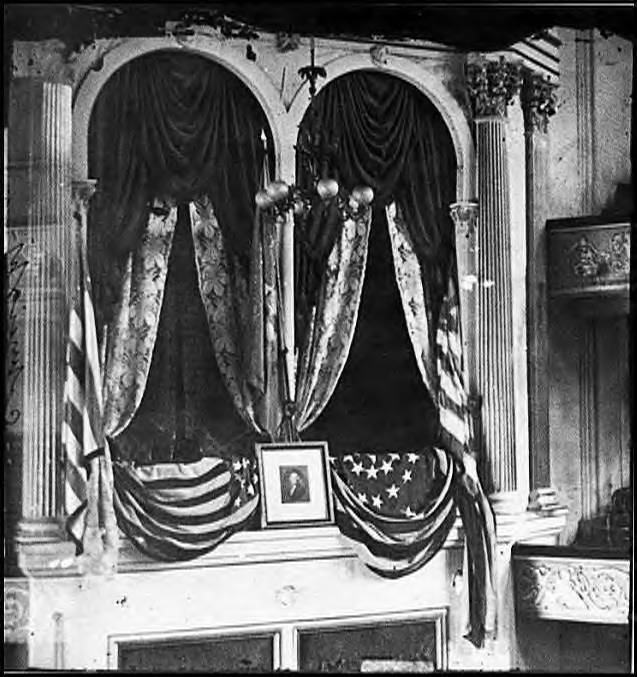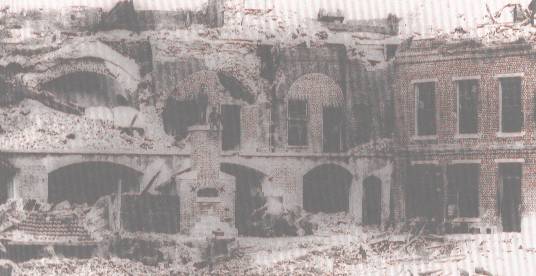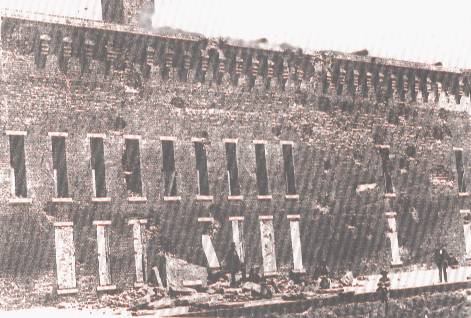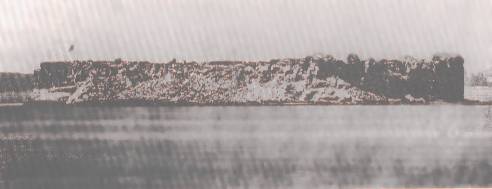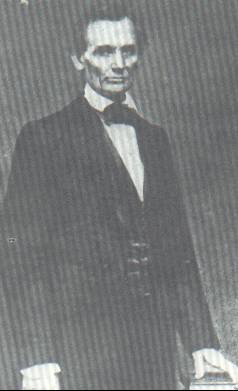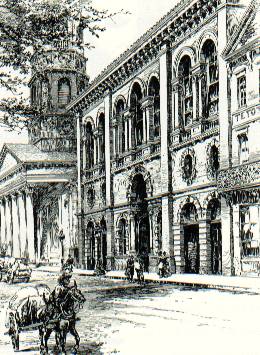|
Hampton Roads Monocacy New Market Seven Days Battles |
The secession of South Carolina having dissolved her connection with the government of the United States, the question of the possession of the forts in the harbor and of the military post at the arsenal became at once a question of vital interest to the State. Able commissioners, Robert W. Barnwell, James H. Adams and James L. Orr, were elected and sent by the convention of the State to treat with the government at Washington for an amicable settlement of this important question, and other questions growing out of the new relation which South Carolina bore to the Union. Pending the action of the commissioners in Washington, an unfortunate move was made by Maj. Robert Anderson, of the United States army, who commanded the only body of troops stationed in the harbor, which ultimately compelled the return of the commissioners and led to the most serious complications. An understanding had been established between the authorities in Washington and the members of Congress from South Carolina, that the forts would not be attacked, or seized as an act of war, until proper negotiations for their cession to the State had been made and had failed; provided that they were not reinforced, and their military status should remain as it was at the time of this understanding, viz., on December 9, 1860.
Fort Sumter, in the very mouth of the harbor, was in an unfinished state and without a garrison. On the night of the 26th of December, 1860, Maj. Robert Anderson dismantled Fort Moultrie and removed his command by boats over to Fort Sumter. The following account of the effect of this removal of Major Anderson upon the people, and the action of the government, is taken from Brevet Major-General Crawford's "Genesis of the Civil War." General Crawford was at the time on the medical staff and one of Anderson's officers. His book is a clear and admirable narrative of the events of those most eventful days, and is written in the spirit of the utmost candor and fairness. In the conclusion of the chapter describing the removal, he says:
The fact of the evacuation of Fort Moultrie by Major Anderson was soon communicated to the authorities and people of Charleston, creating intense excitement. Crowds collected in streets and open places of the city, and loud and violent were the expressions of feeling against Major Anderson and his action ... [The governor of the State was ready to act in accordance with the feeling displayed.] On the morning of the 27th, he dispatched his aide-de-camp, Col. Johnston Pettigrew, of the First South Carolina Rifles, to Major Anderson. He was accompanied by Maj. Ellison Capers, of his regiment. Arriving at Fort Sumter, Colonel Pettigrew sent a card inscribed, "Colonel Pettigrew, First Regiment Rifles, S.C. M., Aide-de-Camp to the Governor, Commissioner to Major Anderson. Ellison Capers, Major First Regiment Rifles, S.C. M." . . . Colonel Pettigrew and his companion were ushered into the room. The feeling was reserved and formal, when, after declining seats, Colonel Pettigrew immediately opened his mission: "Major Anderson," said he, "can I communicate with you now, sir, before these officers, on the subject for which I am here?" "Certainly, sir," replied Major Anderson, "these are all my officers; I have no secrets from them, sir." The commissioner then informed Major Anderson that he was directed to say to him that the governor was much surprised that he had reinforced "this work." Major Anderson promptly responded that there had been no reinforcement of the work; that he had removed his command from Fort Moultrie to Fort Sumter, as he had a right to do, being in command of all the forts in the harbor. To this Colonel Pettigrew replied that when the present governor (Pickens) came into office, he found an understanding existing between the previous governor (Gist) and the President of the United States, by which all property Within the limits of the State was to remain as it was; that no reinforcements were to be sent here, particularly to this post; that there was to be no attempt made against the public property by the State, and that the status in the harbor should remain unchanged. He was directed also to say to Major Anderson that it had been hoped by the governor that a peaceful solution of the difficulties could. have been reached, and a resort to arms and bloodshed might have been avoided; but that the governor thought the action of Major Anderson had greatly complicated matters, and that he did not now see how bloodshed could be avoided; that he had desired and intended that the whole matter might be fought out politically and without the arbitration of the sword, but that now it was uncertain, if not impossible.
To this Major Anderson replied, that as far as any understanding between the President and the governor was concerned, he had not been informed; that he knew nothing of it; that he could get no information or positive orders from Washington, and that his position was threatened every night by the troops of the State. He was then asked by Major Capers, who accompanied Colonel Pettigrew, "How?" when he replied, "By sending out steamers armed and conveying troops on board ;" that these steamers passed the fort going north, and that he feared a landing on the island and the occupation of the sand-hills just north of the fort; that 100 riflemen on these hills, which commanded his fort, would make it impossible for his men to serve their guns; and that any man with a military head must see this. "To prevent this," said he earnestly, "I removed on my own responsibility, my sole object being to prevent bloodshed." Major Capers replied that the steamer was sent out for patrol purposes, and as much to prevent disorder among his own people as to ascertain whether any irregular attempt was being made to reinforce the fort, and that the idea of attacking him was never.. entertained by the little squad who patroled the harbor.
On Morris island, Gen. James Simons was commanding, with Lieut.-Col. W. G. De Saussure for his artillery chief, and Maj. W. H. C. Whiting for chief of staff. The infantry supports on the island were the regiments of Cols. John Cunningham, Seventeenth South Carolina militia, and Maxey Gregg, Johnson Hagood and J. B. Kershaw, of the South Carolina volunteers. The artillery was in position bearing on Ship channel, and at Cummings point, bearing on Sumter. The fleet making no attempt to come in, the channel batteries took no part in the bombardment of Sumter. On Cummings point, six i o-inch mortars and six guns were placed. To the command and direction of these guns, Maj. P. F. Stevens was specially assigned. One of the batteries on the point was of unique structure, hitherto unknown in war. Three 8-inch columbiads were put in battery under a roofing of heavy timbers, laid at an angle of forty degrees, and covered with railroad T iron. Portholes were cut and these protected by heavy iron shutters, raised and lowered from the inside of the battery. This battery was devised and built by Col. Clement H. Stevens, of Charleston, afterward a briga-dier-general and mortally wounded in front of Atlanta, July 20, 1864, leading his brigade. "Stevens' iron battery," as it was called, was "the first ironclad fortification ever erected," and initiated the present system of armor-plated vessels. The three mortars in battery at Port Johnson were commanded by Capt. G. S. James. The batteries above referred to, including Fort Moultrie, contained fifteen 10-inch mortars and twenty-six guns of heavy caliber. For thirty-four hours they assaulted Sumter with an unceasing bombardment, before its gallant defenders consented to give it up, and not then until the condition of the fort made it impossible to continue the defense. Port Moultrie alone fired 2,490 shot and shell. Gen. S. W. Crawford, in his accurate and admirable book, previously quoted, thus describes the condition of Sumter when Anderson agreed to its surrender: "It was a scene of ruin and destruction. The quarters and barracks were in ruins. The main gates and the planking of the windows on the gorge were gone;the magazines closed and surrounded by smouldering flames and burning ashes; the provisions exhausted; much of the engineering work destroyed; and with only four barrels of powder available. The command had yielded to the inevitable. The effect of the direct shot had been to indent the walls, where the marks could be counted by hundreds, while the shells, well directed, had crushed the quarters, and, in connection with hot shot, setting them on fire, had destroyed the barracks and quarters down to the gun casemates, while the enfilading fire had prevented the service of the barbette guns, some of them comprising the most important battery in the work. The breaching fire from the columbiads and the rifle gun at Cummings point upon the right gorge 'angle, had progressed sensibly and must have eventually succeeded if continued, but as yet no guns had been disabled or injured at that point. The effect of the fire upon the parapet was pronounced. The gorge, the right face and flank as well as the left face, were all taken in reverse, and a destructive fire maintained until the end, while the gun carriages on the barbette of the gorge were destroyed in the fire of the blazing quarters." The spirit and language of General Beauregard in communicating with Major Anderson, and the replies of the latter, were alike honorable to those distinguished soldiers. The writer, who was on duty on Sullivan's island, as major of Pettigrew's regiment of rifles, recalls vividly the sense of admiration felt for Major Anderson and his faithful little command throughout the attack, and at the surrender of the fort. "While the barracks in Fort Sumter were in a blaze," wrote General Beauregard to the secretary of war at Montgomery, "and the interior of the work appeared untenable from the heat and from the fire of our batteries (at about which period I sent three of my aides to offer assistance), whenever the guns of Fort Sumter would fire upon Moultrie, the men occupying the Cummings point batteries (Palmetto Guard, Captain Cuthbert) at each shot would cheer Anderson for his gallantry, although themselves still firing upon him; and when on the 15th instant he left the harbor on the steamer Isabel, the soldiers of the batteries lined the beach, silent and uncovered, while Anderson and his command passed before them." Thus closed the memorable and momentous attack upon Fort Sumter by the forces of South Carolina, and thus began the war which lasted until April, 1865, when the Southern Confederacy, as completely ruined and exhausted by fire and sword as Fort Sumter in April, 1861, gave up the hopeless contest and reluctantly accepted the inevitable.
We were next ordered up to Fort Sumpter which was built of bricks and perpendicular walls with several tiers of guns, but now it was only a sloping mound of bricks and dirt-like pyramid. Here we found comfortable quarters. During the day we carried on our backs sand bags to strengthen the weakened places. This work was very hard on me, as I had never done any manual labor. By night there was guard duty on the parapets, where we dodged as best we could the enemy shells sent over from Morris Island. Soon General Robert E. Lee was calling for help and we started for Virginia. Before leaving Charleston, I was given permission to tell my family goodbye, not knowing if I would ever return. My Mother gave me a shirt made from a window curtain. It was of a loud pattern and very gay. At the depot, I was given a seat on the floor of a box car and South Carolina was soon left behind. Our first engagement was at Port Walthalla between Richmond and Petersburg. The enemy had a large army and we a small one. We fought until night, winning the battle. One incident of the day, I remember particularly.My sixty rounds or cartridges were gone and I asked permission to get some from the dead. The dead and wounded were lying all about. The wounded begged for water and my canteen was soon empty. I took canteens from the dead and watered the living. I was a target for sharp shooters, their bullets were falling all around, but it was impossible to refuse the pitiable appeals of the dying. However, I obtained all the cartridges I needed and continued the battle for several days. The exposure gave me a high fever and I was sent to the hospital for three days. On returning, found my regiment almost depleted of men. We were constantly moving onward with no rest. I built breast works by day was was on picket duty by night. Finally we were told General Grant was changing his base and advancing on Petersburg. Imagine our travelling on foot on a dusty road where thousands were in front and behind, my equipment a blanket, a frying pan, a canteen, sixty rounds or ammunition and a gun, but I was not overloaded with an abundance of food, as my haversack was always empty.
All day we were forced on and on and when night came I laid down just as I was, too tired to even remove my shoes and I cried like a baby from sheer exhaustion. We were on a forced march the second day so as to meet General Grant.
At dawn we built up breast works, moved up one-half a mile and built more breast works. That night my captain and I slept together in the ditch, his oil cloths spread on the ground and both covered with my blanket. In the morning I was wakened by Grant's shrapnel, one bursting just over us. I shook my captain to wake him and found that a piece of shrapnel had struck him in the temple and he was dead. Another piece of the same shell had splintered my gunstock near the muzzle.
General Grant's cannon were doing havoc to our line and we were defenceless. The order came to retreat. Before we could reach safety, we had to pass an unprotected field. We started to run, every fellow for himself. Shells bursting every where. We were greatly out-numbered, a picket line against an army. It was impossible to hold out. When we reached our own main line, I will never forget General Hagood's reception, mounted on a horse with pistol in hand, he cried out that the first man attempting to enter the line he would kill. He commanded us to go back and capture the line we had deserted. It was death to go forward and death to remain. Orders were orders, so back we went, climbing over the dead, fighting hand to hand ten to one. To kill like this was murder, so I took a man as prisoner. Taking him back to my line, I offered to exchange his haversack for mine. He was willing (each thought the other had food), imagine our disappointment to find both empty.
Having brought in a prisoner I was in hopes of being relieved from duty, but no, back I went for picket duty, staying all night with the dead in a deep ditch. I do not remember how long we were stationed in this ditch. Perhaps a day or two, when suddenly we heard yells and a command to surrender. We were surrounded, captured and taken as prisoners. There were only about 20 of us.
On our way to the Yankee lines, I witnessed a battle, where the northern men were mowed down by the hundreds, others would move up to take their places; these also to be killed, for our marksmenship was most accurate.
I was cross-questioned by a northern officer. One question I remember was "How many men did General Lee have that day engaged?" I answered " Do you expect me to betray my country?" One officer said " Young man, you seem to have a cold. Have a drink." "No", I said, "all that comes from running after the Yankees today. Yelling and scaring them. Besides I would not drink with an enemy." They all laughed and sent me back to my companions.
Before telling you of my prison life, I want to say that this narrative does not cover all of my army life, either in hardships, endurance or privations.
Now as to my prison life. We were taken to the field prison under heavy guard, over dreadful roads, reaching there after dark, dirty, hungry and tired; and slept on the ground. Two days came and went, and we were given nothing to eat. On the third day, we were taken to city Point on the James River, there to take a boat to Point Lookout Maryland, where there were the Union prisons. Here we were lined up for the long promised rations. The provisions were placed on the ground for us. The first food was green bacon sides, which I ate at once and made me desperately ill and was unable to eat again for another three days.
The prison was situated at the point formed by the Potomac River and Cheseapeake Bay, with the high wooden fence around it. We were guarded altogether by negroes. We were housed in "A" tents, five men to each tent. We laid on the bare ground and when one man turned over, all had to turn over. We had for rations a half loaf of bakers wheat bread a day. The water was nautious, and I had to hold my nose to be able to drink it. I was at this prison a month. Here I met a young man named Dan Chaplin. We became fast friends which lasted all during my prison life. Finally I was to leave this accursed place.
We shipped for another prison, going out on the Atlantic Ocean, passing near Fortress Monroe, where Pres. Jefferson Davis was imprisoned. I slept on deck under an old sail. Soon the men below deck became sea sick, and those on deck were ordered below in their place. I tried to play sick, by hanging my head over the railing, which failed to work so down I went. I never saw such a filthy place, no wonder the men were ill. We landed at Jersey City, New Jersey and entrained for Elmira, New York. We were herded like cattle into box cars. I was a marked man, for just before I was made a prisoner I was given a new pair of pants and to save them from the filth on the shipboard, I had turned them wrong side out, so as to appear clean, when I reached my destination.
The prison at Elmira was surrounded by mountains. The pen was in a valley with a small muddy stream running through it. Here I found my friend Chaplin again. He brought me a cold drink of good water, the first I had had since leaving Virginia. Here again we occupied tents. Chaplin and I stayed together. There was a mess hall and hospital on my side of the creek. I had to pass the hospital each morning on my way to breakfast and here I saw laid out on the grass in rows those who had died the night before.
The mess hall was a long room with a long rough table running its length. The rations consisted of one piece of bread and one small piece of meat. It was not enough for a quarter of a meal. Eating this little bit only increased our appetite and we longed for dinner. This was the same as breakfast, never any more. Sometimes we had bean soup, though to call it soup was a misnomer, as it was colored water, with a bean or two at the bottom. After dinner we longed for the night and sleep, so as to forget our hunger. we had this same fare from day to day, and month to month -- never any more or any change. I am quite sure those in charge were starving us to fill their own pockets with money, which was meant to buy provisions for the prisoners. For pastime we made chains of horse hair and rings from buttons, which we sold to the guards.
I have seen the peeling of apples bought when thrown into the gutters, spitoons or any other convenient place, picked up and eaten by those poor hungry wretched creatures. Can you imagine men driven to such a state of starvation? Yet I saw it and such was a fact.
The South may have been accused of starving the Northern prisoners but could it have been any worse than this? If they got less, they could not have lived. Men at Elmira ate rats and anything else that turned up. Some men caught a dog belonging to an officer connected with the prison and ate it. The officer found it out and to punish them he had holes cut in the heads of barrels, only large enough for a man's head to pass through. The barrels were put over their bodies with their heads projecting about on the outside. An upright piece was nailed to the barrell with a sign that read: "These are Dog Eaters". There men were marched up and down the prison streets followed by a fife and drum to attract attention.
We tried to better our tents, by building a floor, made from boxes, so as not to be forced to sleep in mud. When mine was finished it looked much more comfortable, but an officer passed and ordered the floors removed.
In winter we moved into wooden buildings with bunks three tiers high. Chaplin and I were still together. We sat on the floor and talked, as there was nothing else to do. This went on for months. One day I was sent for by General Beal, the officer in charge of the prison. He questioned me and I was handed a letter addressed in a lady's handwriting. Upon opening it I found she was a great friend of my brother, Charlie. He was an officer on board the "Shennandoah". She met him in England and he entreated her to hunt for me, for he had heard I was a prisoner. Faithful to her promise, she wrote to every prison and finally found me at Elmira. Her letter told me of my brother and that I was able to ask for anything I wanted. She sent me a large box of eatables, clothing, blankets and a Bible. The General asked me many questions as to the lady who sent me so much. So Chaplin and I lived high for a time.
After three years of prison life, my name was included in a list of sick men to be sent south in exchange for Northern prisoners. We travelled by train to Baltimore and at Richmond I was sent to a hospital too ill to travel further. The matron one day happened to speak of a very ill man just brought in from Elmira prison before a group of men. Chaplin was one of them. He came to see who the ill man was and was astonished to find his old friend. He told them who I was, that I was the son of the medical purveyor of General Beauregard's army. After this everything was done for my welfare. Chaplin obtained his furlough with mine. We were given sixty days leave and transportation to go home and recover. I went to Camden and he to Watterboro. My way lead down General Sherman's route -- everything was destroyed . The devil himself could not have done it more thoroughly. The roads were offensive from the dead carcasses left in the wake of the army. I labored on, meeting no one, and at night I lay down by a stream wrapped in my blanket Miss Nannie Wells had given me. The next day I could not stand. I crawled down to the stream for water, a negro passed and I asked him to carry me on his back to shelter, giving him the blanket in payment. He said there was a small village near, that had escaped General Sherman's march. There he carried me to a lady's home who put me to bed, fed me and clothed me. I told her I was trying to reach my uncle John Dent's home near Camden. She said there was a wagon of corn going there and I could ride in it. We reached there at nightfall. My cousins gave me a most hearty welcome. The hand of God seemed to have directed me thus far in a miraculous manner. And now for something more astonishing. In less than an hour after my arrival my father, with all the wagons and army equipment arrived. He met me on the steps and kissed me. What a jollification there was.
He had been ordered by the Confederate government to take all of his army stores, eighty-six wagons and office force, to Abbeville, South Carolina. the next morning he started, taking me with him. During his journey to Abbeville, General Lee surrendered. My father and I returned to Alabama where my Mother had lived during the dreaded days of the War.
This brings me to the end of my army life. I have not told you all, for so much has been forgotten during the intervening years. Though perhaps not interesting, you will at least know of some the great hardships I met with in the great struggle between the North and South and which no one took a part in without feeling a personal pride that he was a soldier in the Southern Army.
" I remember when this site started out as a three page Gettysburg site. Man has it grown! Great Job quot;Joe Willis--Scottsdale,AZ "This is a website for the ages!!"Bob Bullerton--Willows,CA. "I just sit here at my computer,chew on some hardtack and enjoy this site."Tico Carfello--Bronx, NY
Copyright © 2001-2002,Gettysburg Battlefield Online
|
